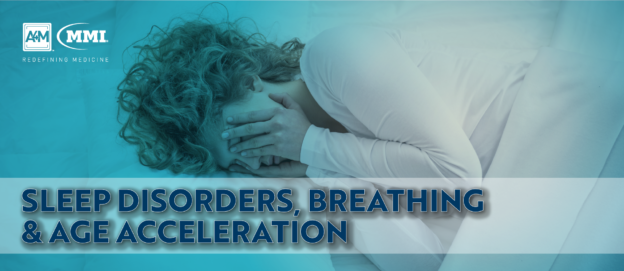Exercise, nutrition, and smoking are the primary modifiable risk factors for a host of health conditions; sleep and increasingly common sleep disorders are often overlooked. The most common type of sleep-disordered breathing– obstructive sleep apnea – affects nearly 30 million adults within the United States and results in oxidative stress as well as inflammation. While previous studies have linked sleep disorders to a multitude of health complications such as heart disease, high blood pressure, and depression, recent research suggests sleep-disordered breathing may cause age acceleration.
The abstract of a new study conducted by a team of researchers at Harvard Medical School in Boston was presented at SLEEP 2019, the annual meeting of the Associated Professional Sleep Societies. Preliminary data from the study reveals the relationship between sleep-disordered breathing and premature aging as well as the adverse effects of untreated sleep disorders.
Sleep Disordered-Breathing and Aging Acceleration
Researchers report a connection between severe sleep-disordered breathing and epigenetic age acceleration, which is a DNA methylation-based marker of rapid biological aging. The study involved a cohort of 622 racially and socioeconomically diverse adults with a mean age of 69 years. The sample was chosen from a larger pool of studied individuals due to the undiagnosed sleep-disordered breathing that was discovered. Participants blood DNA methylation was measured along with their sleep patterns via at-home polysomnography studies – which records breathing patterns, oxygen levels in the blood, brain waves, and limb movements.
Data from the study identified partial or complete obstruction of the airway that interrupts sleep throughout the night as a contributing factor to accelerated epigenetic aging, or early aging of intracellular DNA. Each standard deviation increase in the apnea-hypopnea index – a measure of sleep-disordered breathing severity – contributed to 215 days of biological age acceleration. Simultaneously, each standard deviation in the measure of sleep disruption correlated with 321 days of age acceleration. Data from the study revealed that regardless of BMI, geographic location, health behaviors, and other variable factors, severe sleep-disordered breathing promoted epigenetic age acceleration.
Epigenetic Changes
Along with an increased risk for a range of cardiometabolic conditions, sleep disordered individuals may age faster due to epigenetic changes which change DNA gene behavior as a result of lifestyle and environmental factors. Epigenetic changes can impact the presentation of illnesses such as dementia or cancer in genetically susceptible individuals.
However, epigenetic changes are reversible; this forthcoming research suggests that detecting and treating sleep-disordered breathing may help enhance overall health and promote longevity. Additionally, reversal of these changes may decrease the risk of other age-related issues, namely functional decline, cardiovascular disease, and dementia.
Increased Risk for Women
While women tend to have less severe sleep disorders and are considered to be at a lower risk for health problems related to sleep-disordered breathing, a surprising result of the study revealed that they experience disproportionately more epigenetic changes than men. As women are more likely to have REM-dominant sleep during which sleep apnea occurs or worsens, they may face an increased susceptibility to the adverse effects of sleep-disordered breathing, including faster epigenetic aging.
Although previous research has identified a connection between insomnia and accelerated epigenetic aging, this new study will be the first to link sleep apnea and other sleep-disordered breathing to epigenetic change, adding to the growing list of reasons to treat sleep conditions. “Identifying a link between sleep apnea and accelerated aging, and modifying that effect, has enormous implications for better health as we age,” lead study author, Dr. Xiaoyu Li concluded.
Researchers acknowledged limitations of the study, which included duration – only one night was evaluated – and the lack of a control group of healthy individuals. The team is considering studying another cohort of individuals to replicate their findings before publishing the full data set. Further research is definitely necessary to examine whether treating sleep disordered-breathing has an effect on cell aging and to better determine a comprehensive understanding of the adverse effects of sleep disorders.

